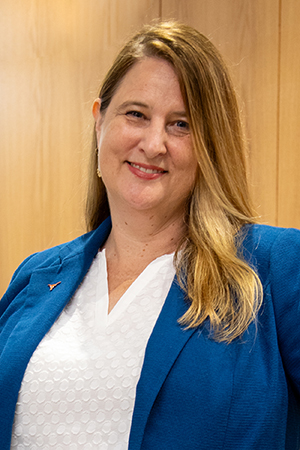How common is disability on college campuses? The Centers for Disease Control and Prevention estimate that up to 1 in 4 (or 27 percent) of American adults have at least one type of disability.
That means over 4 million college students in the U.S. have a disability — including ones that are non-apparent, such as autism, ADHD, or depression — and studies show those students face barriers that make them less likely to persist in their studies, graduate with degrees, and achieve their career goals.
But the actionable research foundation to support their success in higher education does not exist — until now.
Breaking New Ground

A national research center has launched at The University of Texas at Austin to support disabled student experiences and achievement after high school.
The National Disability Center for Student Success will create new research measurements and provide practical strategies to help colleges, universities, and training centers build their capacity to better support disabled students, improve their inclusion in higher education programs, boost degree completion efforts, and increase readiness for the workforce.
Its research team — an innovative collaboration between faculty members and disabled students, along with national partners — will study topics such as disability disclosure, instructor attitudes, and institutional factors and will develop a measurement of campus accessibility.
The National Disability Center was founded by executive director and principal investigator Stephanie W. Cawthon, professor at UT Austin’s College of Education.
ADA is the Floor, Not the Ceiling
Cawthon, who is deaf, is building upon decades of research into how disabled students learn and thrive, as well as her experience developing innovative research models that use collaboration to achieve student-centered insights and findings.
While many people cite legal compliance with the Americans with Disabilities Act (ADA) as the means to provide basic accommodations and classroom accessibility for disabled students, Cawthon reminds colleges and colleagues that the ADA is the floor, not the ceiling, for true access and inclusion.
In higher education, much of the current research and services focus on the deficiencies of disabled students. That approach doesn’t consider the lack of accessibility on campuses or the non-inclusive nature of many college experiences. We must go beyond ADA compliance to shift our systems and create a culture among all campus stakeholders that includes disability as part of a diverse and vibrant student body.
Dr. Stephanie Cawthon
The Disabled Student Experience After High School
Studies show disabled college students find universities to be unwelcoming and unaccommodating places.
Compared to their peers without disabilities, disabled students graduate at lower rates, have fewer employment opportunities, and are half as likely to enroll in a 4-year college.
They also report encountering high levels of ableism, discrimination, and bullying. These experiences are one of the key reasons they do not disclose their disabilities, making it harder for higher education leaders and administrators to understand the true scope of the issue and provide the necessary support.
UT Students and Faculty Members to Collaborate
An interdisciplinary effort, the National Disability Center’s Leadership Team, Student Fellows, and Faculty Cadre are contributing to its research from a wide variety of fields and areas of expertise. But there is one commonality among them: They are all people with disabilities or people deeply connected with the disability community.
The Leadership Team is led by Cawthon as Executive Director and includes:
- Andrew Dillon, Director of Research Dissemination and Co-Investigator (School of Information)
- Greg Roberts, Director of Evaluation and Co-Investigator (Meadows Center for Preventing Educational Risk)
- Shavonne Coleman, Director of Training (University of Michigan)
- Ryan Mata, Coordinator of Student Partnerships (College of Education)
The Faculty Cadre comes from five different colleges at UT Austin:
- Maura Borrego (Cockrell School of Engineering)
- North Cooc (College of Education)
- Denisa Gàndara (College of Education)
- Earl Huff, Jr. (School of Information)
- Alison Kafer (College of Liberal Arts)
- Jen Moon (College of Natural Sciences)
The Student Fellows will receive interdisciplinary training experience, assist with research, and collaborate with the Leadership Team and the Faculty Cadre. They are:
- Soren Aldaco (College of Liberal Arts)
- Lily Alvarez (College of Education)
- Desiree Lama (College of Education)
Housed at the Texas Center for Equity Promotion at UT Austin, the National Disability Center was established with a $5 million grant (Cooperative Agreement #R324C230008) from the Institute for Education Sciences (IES), a division of the U.S. Department of Education that invests in rigorous research. It is the second largest IES award in UT Austin’s history.
Media inquiries should be directed to Tracey Bradnan, Director of Communications for the National Disability Center for Student Success.

